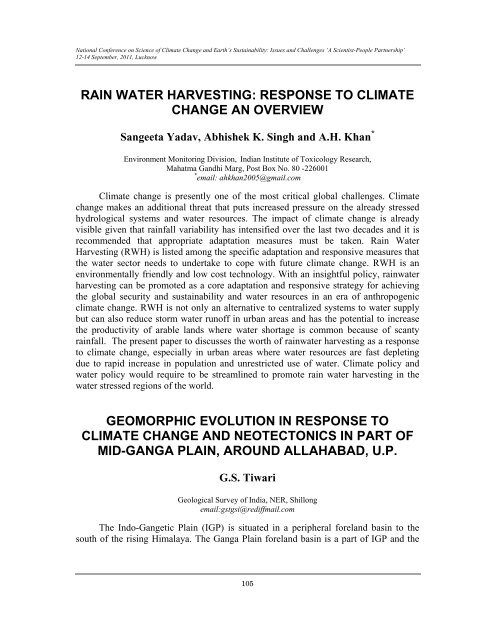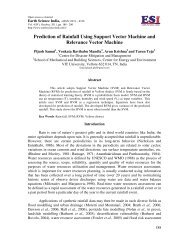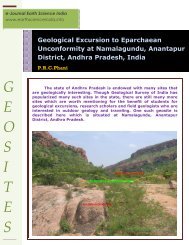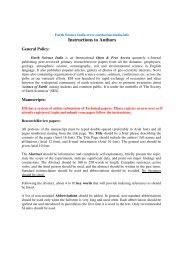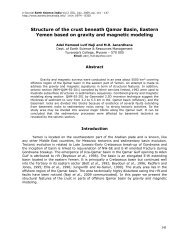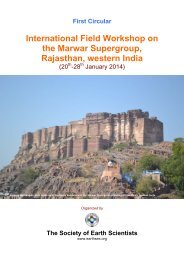12-14 September, 2011, Lucknow - Earth Science India
12-14 September, 2011, Lucknow - Earth Science India
12-14 September, 2011, Lucknow - Earth Science India
You also want an ePaper? Increase the reach of your titles
YUMPU automatically turns print PDFs into web optimized ePapers that Google loves.
National Conference on <strong>Science</strong> of Climate Change and <strong>Earth</strong>’s Sustainability: Issues and Challenges ‘A Scientist-People Partnership’<br />
<strong>12</strong>-<strong>14</strong> <strong>September</strong>, <strong>2011</strong>, <strong>Lucknow</strong><br />
RAIN WATER HARVESTING: RESPONSE TO CLIMATE<br />
CHANGE AN OVERVIEW<br />
Sangeeta Yadav, Abhishek K. Singh and A.H. Khan *<br />
Environment Monitoring Division, <strong>India</strong>n Institute of Toxicology Research,<br />
Mahatma Gandhi Marg, Post Box No. 80 -226001<br />
* email: ahkhan2005@gmail.com<br />
Climate change is presently one of the most critical global challenges. Climate<br />
change makes an additional threat that puts increased pressure on the already stressed<br />
hydrological systems and water resources. The impact of climate change is already<br />
visible given that rainfall variability has intensified over the last two decades and it is<br />
recommended that appropriate adaptation measures must be taken. Rain Water<br />
Harvesting (RWH) is listed among the specific adaptation and responsive measures that<br />
the water sector needs to undertake to cope with future climate change. RWH is an<br />
environmentally friendly and low cost technology. With an insightful policy, rainwater<br />
harvesting can be promoted as a core adaptation and responsive strategy for achieving<br />
the global security and sustainability and water resources in an era of anthropogenic<br />
climate change. RWH is not only an alternative to centralized systems to water supply<br />
but can also reduce storm water runoff in urban areas and has the potential to increase<br />
the productivity of arable lands where water shortage is common because of scanty<br />
rainfall. The present paper to discusses the worth of rainwater harvesting as a response<br />
to climate change, especially in urban areas where water resources are fast depleting<br />
due to rapid increase in population and unrestricted use of water. Climate policy and<br />
water policy would require to be streamlined to promote rain water harvesting in the<br />
water stressed regions of the world.<br />
GEOMORPHIC EVOLUTION IN RESPONSE TO<br />
CLIMATE CHANGE AND NEOTECTONICS IN PART OF<br />
MID-GANGA PLAIN, AROUND ALLAHABAD, U.P.<br />
G.S. Tiwari<br />
Geological Survey of <strong>India</strong>, NER, Shillong<br />
email:gstgsi@rediffmail.com<br />
The Indo-Gangetic Plain (IGP) is situated in a peripheral foreland basin to the<br />
south of the rising Himalaya. The Ganga Plain foreland basin is a part of IGP and the<br />
105


